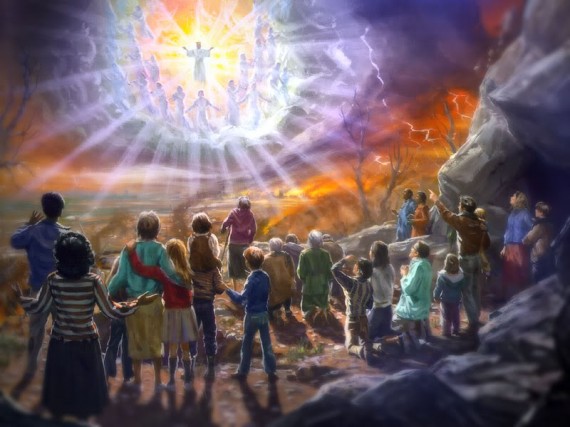
Based on just the title of this post, I can hear lots of people cheering and lots of other people rethinking whether or not they want to go to heaven.
No sports in heaven? For some that is truly heaven, while for others it sounds like hell.
Whichever feeling wells up within you, bear with me…
Someone once told me that since there wasn’t any mention of sports in the Bible, this means that there will be no sports in heaven.
I think that logic is pretty bad, but recently as I was listening to a news update about the passer rating of a certain quarterback, it occurred to me that there was a pretty good theological reason for there not to be any sports in heaven.
Except for baseball…. Kevin Kostner proved that there is baseball in heaven…. 😉

The Theological Reason for No Sports in Heaven
It is often taught in churches that when we get to heaven, we will never get sick, we will never die, we will have all our questions answered, and we will be perfect, as our heavenly Father is perfect.
That sounds nice… until you begin to realize what this means…
I like the idea of no more sickness and no more death, but the more I think about having all my questions answered and being perfect in everything, I am not sure I like that at all.
I am not a sports fanatic, but I like watching some sports, and I even play a bit of sports. … Well, no I don’t. Not any more. But I used to.
But here’s the point:
Sports is based on the universal reality that humans are not perfect in everything we do. That’s why we have batting averages. Free-throw percentages. Quarterback ratings.
Imagine if there was a person who always batted 1000, who never missed a free throw, and whose every pass of the football was for a touchdown.
Such a player would dominate the world of sports. Whatever team he was on would always win. Always.
Now imagine that every single player on both teams played just as perfectly. It sounds thrilling for about one second until you begin to think of what that game would be like.
Imagine a basketball game where every single shot was good. The announcer’s job would be easy. All he would have to say is “He dribbles down the court … he shoots … he scores!” over and over and over. Heck, the players wouldn’t even have to dribble down the court to shoot. All the shots would be full-court shots with 100% accuracy. It sounds thrilling to watch … for about five minutes. Then it becomes incredibly boring.
Of course, it is here where we start to run into problems. Take baseball as another example. It is logically impossible to have a player bat 1000 and have a pitcher throw a perfect game.
So you see? Sports are based on the fact that nobody is perfect in everything.
But if in heaven, everybody is perfect in everything, this means that there could be no sports.
So Heaven Sounds Pretty Dull After All…
Frankly, I find this highly depressing. Not because I am such a sports lover, but because I am such a lover of learning.
I love the pursuit of knowledge for its own sake. Just as some people love sports, I love the feeling of my mind and heart racing as I encounter a new idea from a book or insight on a particular passage of Scripture.
I wonder what life would be like without this. I think it would be pretty boring.
 All in all, heaven is starting to sound like a pretty dull place.
All in all, heaven is starting to sound like a pretty dull place.
So the only thing I can conclude is that we won’t be perfect after all in our eternal state. We will not be perfect. We will not know it all. We will grow and develop and think and ask questions and learn by trial and error. We will invent, inquire, and inspire.
As it turns out, imperfection is the only way heaven can be real and not be hell.
So maybe there will be sports in heaven after all…
All you football fans can breathe a sigh of relief.
But if Heaven Requires Imperfection…
Then the ramifications of this got me thinking.
If we are not perfect in what we know and what we do, does this mean that we can get injured and hurt after all? If, in heaven, I decided I want to learn to become a tightrope walker, and I become so good I decide to tightrope across the heavenly version of Niagara Falls, what happens if I make a mistake and I fall?
Or, what happens if I decide to become a Master Chef, and in cutting potatoes one day, I slip with the knife and slice my finger? Will it cut? Will it hurt? Will it bleed? I cannot see how it cannot. If I remember correctly, I think C. S. Wrote about this is The Problem of Pain. I don’t have the book in front of me, but I seem to remember Lewis explaining that pain tells us when something is wrong. (If you find the section, let me know!) If I cut my finger with a knife, I need it to hurt so that I can know I should stop cutting! If it didn’t hurt, I would keep cutting, and do great damage to my finger.
If there is no pain in our eternal bodies, does this mean that we will never cut our fingers? That the knife turns to rubber if we try? If we are out for a hike on Pluto, and we fall off a cliff, does that mean we will bounce when we hit the bottom? I cannot see how. But on the other hand, there will be no more death, so will we be like the Wolverine from X-Men or Claire from the TV show Heroes who can regenerate no matter what? That’d be cool…
But this then leads me to the question of God.
Earlier when I said that we will be perfect as God is perfect, I intentionally misquoted Matthew 5:48. Why? Because how I misquoted it is how I sometimes hear others misquote it.
In Matthew 5:48, Jesus says that we should be perfect as our heavenly Father is perfect. I have written on this text before by saying it is impossible to live perfect lives, but for our purposes here, note that Jesus does not say that we will ever be perfect just as God is perfect, nor does Jesus even say that God Himself is perfect. Jesus simply says that we should strive to be perfect, in the same way that God is, however that is.
Some people point to 1 Corinthians 13:10 as evidence that when we get to heaven we will be perfect, but this verse is talking about spiritual gifts and is not teaching anything about mental or physical perfection when we get to heaven.
Then there is 1 John 3:2-3. Some say that since Jesus is perfect, when we see Him, we will become just like Him, and hence, we will also be perfect. Well again, I am not denying that we will become like Jesus. And I am not denying that through glorification, we will achieve moral perfection.

Come to think of it, I cannot think of a verse anywhere in the Bible which says that in our glorified bodies, we will be perfectly perfect in every way, including all our mental, moral, emotional, spiritual, and physical capacities. Can you think of anywhere that teaches this?
If were to achieve this perfectly perfect perfection, then we would be exactly like God.
Or maybe …. could it be? …. maybe God is not like this either? Maybe we constructed a God of our own liking according to platonic philosophical ideas of what “perfection” entails, and God is not like that at all!
Is it possible that God Himself learns, invents, and inquires as well?
Could it be that our creative desire to see and try new things comes from the very nature of God Himself?
Maybe we seek answers to life’s problems because God does.
Maybe we want to explore, discover, and seek because God has these desires too.
Of course, maybe, just maybe, we have no clue what heaven will be like after all, and this whole post is a bunch of malarkey.
One thing is for sure … who ever knew that sports could get you thinking about heaven?




 I sometimes hear pastors and teachers say that Jesus talked about hell more than heaven, and so we should do the same in our evangelism.
I sometimes hear pastors and teachers say that Jesus talked about hell more than heaven, and so we should do the same in our evangelism. inally, Gehenna refers to an actual place that existed outside the gates of Jerusalem. It was a little valley in which trash was thrown to be burned. This imagery must be understood wherever Jesus talks about “hell fire” and uses Gehenna (cf. Matt 5:22).
inally, Gehenna refers to an actual place that existed outside the gates of Jerusalem. It was a little valley in which trash was thrown to be burned. This imagery must be understood wherever Jesus talks about “hell fire” and uses Gehenna (cf. Matt 5:22).
 The basic idea behind soul sleep is that when a person dies, they do not immediately go to heaven to be with God, but enter into a state of unconscious limbo. They are no longer alive, but they are not in heaven either. They are not conscious of being dead, but they have not ceased to exist. Instead, they are “asleep.”
The basic idea behind soul sleep is that when a person dies, they do not immediately go to heaven to be with God, but enter into a state of unconscious limbo. They are no longer alive, but they are not in heaven either. They are not conscious of being dead, but they have not ceased to exist. Instead, they are “asleep.” 

 I followed the word “traditional” above with question marks because although this view is traditional for me (it is what I have been taught for most of my life), I am not sure that this is the traditional view throughout all church history. I suspect that it is not.
I followed the word “traditional” above with question marks because although this view is traditional for me (it is what I have been taught for most of my life), I am not sure that this is the traditional view throughout all church history. I suspect that it is not. No, the Kingdom of God primary comes through giving cups of cold water, through speaking the truth in love, through loving, feeding, and clothing those who have less than we do, through hugs to the lonely, meals to the hurting, through being present with the broken.
No, the Kingdom of God primary comes through giving cups of cold water, through speaking the truth in love, through loving, feeding, and clothing those who have less than we do, through hugs to the lonely, meals to the hurting, through being present with the broken.